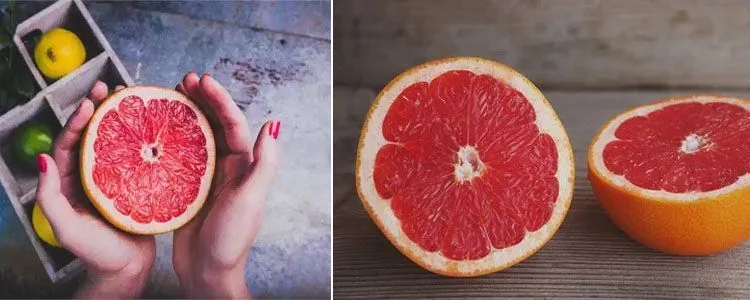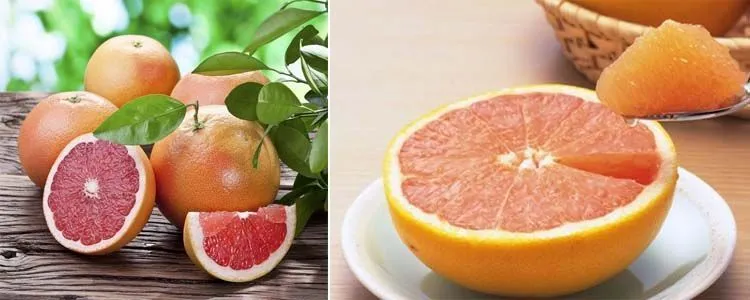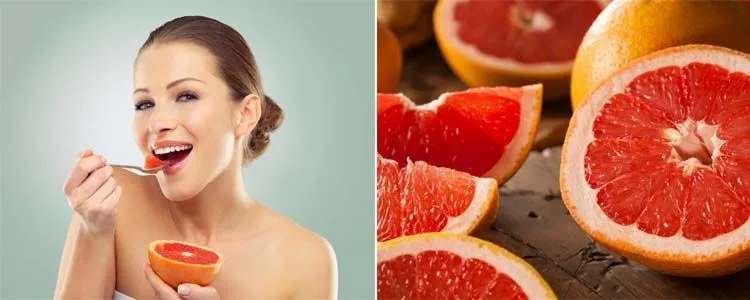The properties of grapefruit have always been at the foot of scientific research, because it produced some interactions with famous drugs. As a result of these studies, they have also managed to establish benefits that are applicable in a multitude of problems.
Grapefruit is a fruit that belongs to the citrus group. Although its consumption is much lower than orange, tangerine or lemon, among others, its consumption can be very interesting when we want to introduce more nutrients, antioxidants and fiber to our diet.
Therefore, we wanted to gather the most interesting properties of grapefruit and study possible contraindications, since it is the main obstacle to the consumption of this type of fruits rich in antioxidants.
Table of Contents
Balanced nutrient composition

Many fruits provide excess sugars that are counterproductive for patients suffering from diabetes. In this case, grapefruit gives us a balanced concentration of nutrients but with a low calorie content.
In fact, compared to others, grapefruit is the one that provides the least energy, but without disregarding high values of vitamins and fiber.
Nutritional composition
Interesting nutritional values for a piece of 230 grams
| Nutrient | Concentration | % Recommended Daily |
|---|---|---|
| Energy | 96.6 kcal | 5% |
| Proteins | 1.8 g | 4% |
| Fats | 0.3 g | 0% |
| Carbohydrates | 24.5 g | 8% |
| Dietary fiber | 3.7 g | 15% |
Important of this table of values is its high fiber content, where a piece of grapefruit or juice provides us with 15% of the total daily fiber, something to take into account given that 8 out of 10 people don’t get enough fiber.
Minerals
- Calcium: 50.6 mg (5% RDA)
- Iron: 0.2 mg (1% RDA)
- Magnesium: 20.7 mg (5% RDA)
- Phosphorus: 41.4 mg (4% RDA)
- Potassium: 311 mg (9% RDA)
- Zinc: 0.2 mg (1% RDA)
- Copper: 0.1 mg (4% RDA)
- Manganese: 0.1 mg (3% RDA)
Vitamins
- Vitamin A: 2645 IU (53% RDA)
- Vitamin C: 71.8 mg (120% RDA)
- Vitamin E: 0.3 mg (1% RDA)
- Thiamine: 0.1 mg (7% RDA)
- Ribolvan: 0.1 mg (4% RDA)
- Niacin: 0.5 mg (2% RDA)
- Vitamin B6: 0.1 mg (6% RDA)
- Folate: 29.9 mg (7% RDA)
It is also important to talk about the bioactive compounds present in the properties of grapefruit, mostly antioxidant, and that gives rise to the multitude of benefits studied scientifically.
Properties of grapefruit
Activates and protects the immune system
The habitual consumption of fruits and vegetables, due to their level of vitamins and antioxidants, activates the immune system and prevents possible diseases.
This is the case of the common cold, where it is always recommended to take high amounts (at least, as necessary) of vitamin C for its benefit against the common cold. [Study]
We must assess the high concentration of vitamin C offered by all citrus fruits. The variety in its consumption (oranges, mandarins, lemons, grapefruits, etc.) is the most complete way to provide all the minerals and concentrates we need.
However, a notable difference is that grapefruit also provides a significant amount of vitamin A, which has been shown to be of interest in the prevention of inflammation and infectious diseases. [SEE CLINICAL TRIALS]
This, added to the concentration of minerals that also have positive effects on the body (zinc, manganese, copper, etc.), acts as a preventive shock against diseases.
Helps you lose weight

Grapefruit is a fruit that can be easily incorporated into our diet to achieve positive results in weight loss. It provides few calories and has a high fiber content, so it increases digestion time and favors the feeling of filling faster.
This benefitIo is applicable to many other fruits and vegetables with fiber, as scientific studies have shown [See more information]
Introducing less fat and carbohydrates into the diet and replacing it with dietary fiber, giving more importance to fruits and vegetables, is a symptom of health and reduction of body weight, as long as it is added to moderate physical activity.
Faced with the feeling of hunger in the middle of the morning or during the delay, the consumption of a grapefruit will satisfy this need and will provide less than 100 kcal, since it provides a lot of water.
Improves insulin resistance and diabetes
Insulin is a hormone that works by regulating various metabolic processes in the body. Its best-known role is that of regulating sugar in the bloodstream.
Several scientific studies have indicated that the consumption of half grapefruit before the main meal produced a significant reduction in insulin levels and increased insulin resistance, compared to the control group. [More information]
Generally speaking, increasing foods high in fiber and low in fat and sugars has also been shown to reduce the risk of type 2 diabetes.
Activates the cardiovascular system
The properties of grapefruit exert a positive action on the risk factors of cardiovascular diseases. Specifically, we refer to 2 main terms, which are high cholesterol and high blood pressure or hypertension.
The consumption of the properties of grapefruit usually (like other types of citrus fruits), produced a significant decrease in blood pressure within a period of less than 6 weeks. Likewise, this decrease also occurred with respect to ldl cholesterol levels (considered as bad), enhancing the good (HDL). [Study]
Cardiovascular regulation and decreased hypertension caused by the properties of grapefruit may be due to a high potassium content.
Regular consumption of this mineral in the recommended daily amounts significantly reduces the risk of death from heart disease, as has been shown in many scientific trials.
In the same way, natural products rich in antioxidants favor the protection and prevention against heart disease and stroke,
High antioxidant content
Within the properties of grapefruit, a high group of antioxidant substances beneficial to the body can be listed. The high consumption of these substances considerably reduces the condition of many diseases, including cancer.
This is because the activity of antioxidants reduces the presence of free radicals, substances that have a high oxidizing power and cause negative reactions for the body.
Main antioxidants present in grapefruits:
Flavanones: flavonoids they possess anti-inflammatory properties. With them it is possible to reduce blood pressure and lower the levels of bad cholesterol. Therefore, they act to the detriment of heart disease.
Beta-carotene: its metabolic transformation produces vitamin A, which is shown to reduce inflammation and chronic conditions related to heart problems, cancer, eye disorders and muscle degeneration.
Vitamin C: one of the largest known antioxidants, whose concentration is very high in grapefruit and other citrus fruits. Currently the scientific community is introducing high concentrations in cancer patients and the results are very positive, although more research is needed.
Lycopene: This antioxidant substance, also present in tomatoes, promotes the prevention of cancer, especially prostate cancer. It also reduces the development and growth of tumors and decreases the side effects associated with it. [Study]
May reduce the risk of kidney stones

The usual consumption of citrus fruits, such as grapefruit. can favor the reduction of suffering kidney stones (known as kidney stones), caused by the accumulation of insoluble and waste substances, such as calcium oxalate.
The way that the human body has to eliminate these insoluble substances is through urine, but depending on the size of the aggregates it can cause a strong pain until its elimination.
The AliMentos rich in citric acid, included in the properties of grapefruit, have been shown to reduce the formation of these aggregates or, at least their size, since they acidify the medium and increase its solubility.
In addition, citric acid can bind with calcium forms, reducing ligand with oxalates. [Study]
Grapefruit is very moisturizing
Fruits, especially citrus fruits, melon and watermelon, have a high water content. This means that, in addition to a high satiating power, they improve hydration.
88% of the total weight of grapefruit is water, hence its level of soluble vitamins is high.
For those people who find it difficult to consume water daily, especially people with diabetes and the elderly, the high consumption of fruits, such as grapefruit, promotes proper hydration of the body and a greater expulsion of liquids and lower blood pressure.
Buy grapefruit extract
Although the greatest benefits are achieved with the consumption of grapefruit (for the fiber, minerals and vitamins contained), there are also grapefruit seed extract, which retains many antioxidant properties (such as flavonoids) and high levels of vitamin C, among others.
Interactions and contraindications of grapefruit
One of the biggest problems grapefruit has is the interaction with some medically important medications.
When reading the package leaflet of many pharmacological products, it announces possible interactions with them if consumed in the following hours grapefruit. [Study]
The source of the problem is that grapefruit inhibits a substance known as cytochrome P450, which is necessary to metabolize the medications we take orally.
A slowdown in the breakdown of these pharmacological derivatives can cause overdose or adverse effects that will depend on the nature of the drug.
Drugs that usually give problems of negative interaction with the properties of grapefruit are:
- Immunosuppressive.
- Benzodiazepines (psychotropic medications).
- Statins (cholesterol reducers).
- Products based on blocking calcium channels.
- Indinavir (protease inhibition of HIV-1 and HIV-2).
- Carbamazepine (anticonvulsant drug).
Before any medication consumed, it is vital to consult a medical specialist or, at least, carefully read the package leaflet of the drug and consult a vademecum.
Other contraindication Of the acidic foods is that, consumed frequently, can cause loss of tooth enamel. It is advisable to rinse your mouth well or brush your teeth after eating foods rich in citric acid or other acids.
